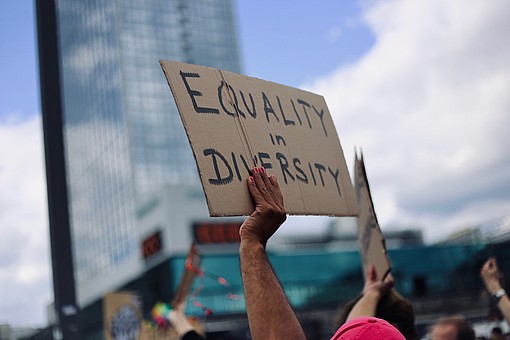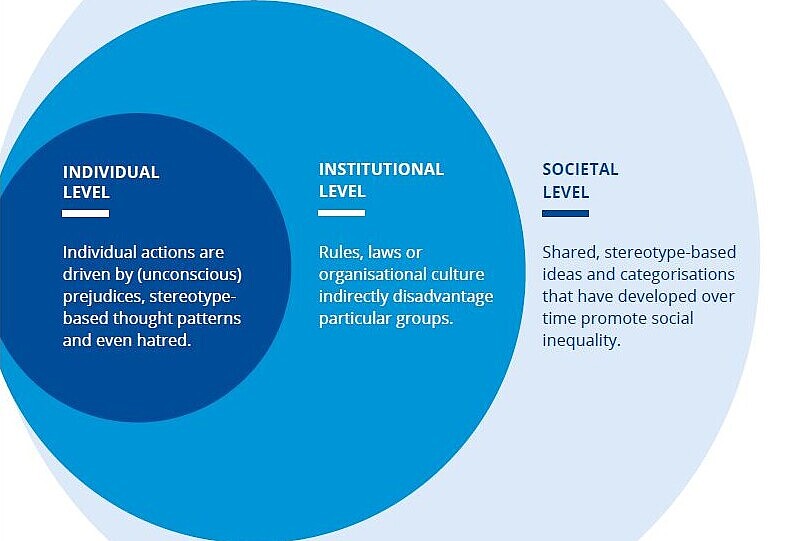Our anti-discrimination work
HAW Hamburg views itself as having a particular duty to promote anti-discrimination and equal opportunities. For the university this means eliminating discriminatory structures and processes and decisively countering discriminatory behaviour, harassment and violence.
Our work
Preventing discrimination
................................................................................................................................................................................................
- Promotion of networking on the issue of anti-discrimination between the university administration and the counselling and support services
- Evaluation and expansion of the advising, support and complaints processes in cases of discrimination
- Creation of programmes to raise awareness of anti-discrimination among university members, associate members and internal organisational units
- Provision of support to internal organisational units in the design of awareness-raising and empowerment measures
- Development, evaluation and adaption of preventative measures to protect against discrimination
- Expansion and guaranteeing of accessibility on university campuses
Creating a discrimination-aware university
................................................................................................................................................................................................
- Raising awareness of discrimination through brochures, workshops and professional development for employees, university members and internal organisational units
- Promotion of empowerment and provision of support for people who have experienced discrimination
- Support for professors and instructors in implementing discrimination-aware and inclusive teaching content and methods
- Advising of central organisational units and the faculties on how to design structures and processes to support equal opportunities and diversity
- Expansion of accessibility and inclusion on the university campuses
What is discrimination?
Discrimination is the unequal treatment and marginalisation of groups or individuals on the basis of particular characteristics.
Every form of disadvantage, disregard, disparagement, disdain, exclusion or unequal treatment of individuals or groups based on actual or ascribed characteristics is discriminatory (direct discrimination). Even seemingly neutral behaviours, rules and regulations that apply to everyone can sometimes have discriminatory impacts on certain groups in practice (indirect discrimination). When the adjustments and changes necessary for people with disabilities to exercise their human rights to participation and education are withheld, this also constitutes discrimination (withholding of necessary adjustments).
The decisive factor for discrimination is the outcome, not the motive. Discrimination can therefore also occur even without malicious intent or simply as a result of thoughtlessness.
Grounds of discrimination
The General Act on Equal Treatment (AGG) defines specific protected characteristics and prohibits discrimination on these grounds. They are:
- Racist ascriptions and ethnic origin
- Gender identity (including non-binary identities and trans and inter individuals)
- Religion or worldview (also includes not belonging to or subscribing to a particular religion or worldview)
- Disabilities (e.g. sensory or mobility impairments, certain mental and chronic illnesses)
- Age
- Sexual orientation
HAW Hamburg's Anti-Discrimination Policy supplements these ground of discrimination with the following characteristics:
- Social origin/status (e.g. education, income, occupation)
- Family status (e.g. (un)married, childcare or caregiving responsibilities)
- Nationality and citizenship
- Appearance (e.g. weight, clothing, language)
- All chronic illnesses
The AGG only provides protection for chronic illnesses that are defined as disabilities. The Federal Anti-Discrimination Agency explains when a chronic illness is also considered a disability.
Discrimination is rooted in personal prejudices, institutional structures and derogatory ascriptions that prevail in society.
These three levels of discrimination influence and reinforce one another, causing individuals and groups to experience disadvantage in interpersonal interactions, at their place of study or work, or in public. Inclusion and equal opportunity can only be achieved if discrimination is eliminated on all of these levels.
Our projects

Anti-Discrimination Policy
The HAW Hamburg Anti-Discrimination Policy outlines the protected characteristics and types of discrimination, details preventative measures for eliminating discrimination, and provides information on obtaining support and taking action for those who have experienced discrimination. In this way, HAW Hamburg is fulfilling its legal responsibility to counter discrimination and promote equal opportunities as well as its own goal of doing so.
You can find everything you need to know about the HAW Hamburg Anti-Discrimination Policy here.

Getting support in cases of discrimination
Have you experienced or observed discrimination? The Anti-Discrimination Policy has implemented a binding procedure and support services for those impacted by discrimination. This page provides information about possible courses of action, HAW Hamburg's counselling and support services, and the submission of complaints to the AGG Complaints Office.
Contact information
Project staff member – Anti-discrimination and diversity
This position is currently vacant. Please direct questions to the following email address:
diversity(@)haw-hamburg.de

